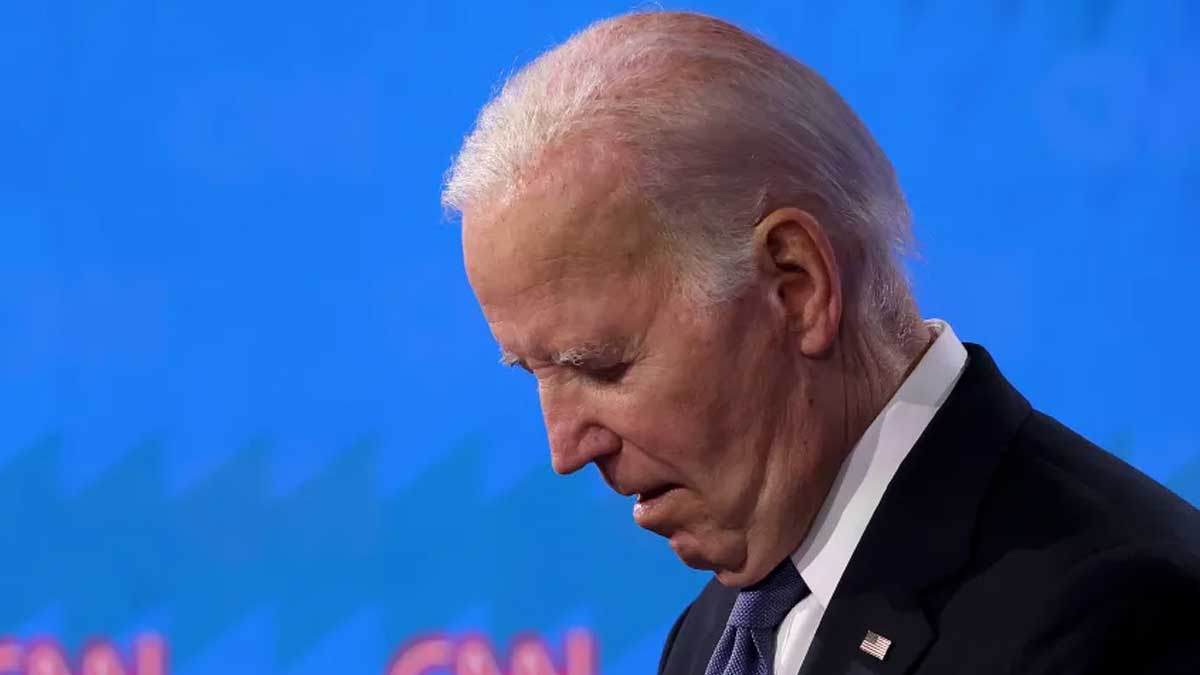- Home
- Billionaires
- Investing Newsletters
- 193CC 1000
- Article Layout 2
- Article Layout 3
- Article Layout 4
- Article Layout 5
- Article Layout 6
- Article Layout 7
- Article Layout 8
- Article Layout 9
- Article Layout 10
- Article Layout 11
- Article Layout 12
- Article Layout 13
- Article Layout 14
- Article Sidebar
- Post Format
- pages
- Archive Layouts
- Post Gallery
- Post Video Background
- Post Review
- Sponsored Post
- Leadership
- Business
- Money
- Small Business
- Innovation
- Shop
Recent Posts
Can Democrats Replace Biden if He Exits 2024?

President Joe Biden’s faltering performance in Thursday’s debate has sparked discussions among some left-wing commentators about the possibility of him stepping down and allowing the Democratic Party to appoint a different candidate—an unprecedented situation that would require significant opposition from Biden’s supporters. Currently, Biden has affirmed his intention to continue his campaign.
There is no official mechanism to remove Biden from the ticket if he doesn’t voluntarily withdraw, but the delegates who will vote to select the nominee at the party’s August convention could potentially revolt and choose another candidate. Biden has dominated the primaries, securing nearly 3,900 of the party’s 4,000 pledged delegates who are expected to reflect the sentiments of those who elected them.
A revolt seems improbable as pledged delegates, although not legally bound to vote for Biden, are typically loyalists of the party’s chosen nominee. These delegates are elected at state party conventions or through primaries and caucuses, often under the significant influence of the party’s preferred candidate. If Biden or any candidate fails to secure a majority of pledged delegates on the first ballot at the convention, voting continues until someone achieves an outright majority, with delegates free to vote for any candidate in subsequent ballots. Additionally, around 700 unpledged “superdelegates”—elected officials and party leaders—can vote for anyone they choose on the second ballot.
If Biden steps aside before the convention, his pledged delegates would be free to vote for an alternative candidate in an open convention, likely leading to intense negotiations among Democratic politicians. If Biden steps aside after the convention, the Democratic National Committee’s approximately 500 members could convene a special meeting to choose a new presidential and vice presidential nominee by majority vote.
The party plans to select a nominee before the convention starts on August 19 via virtual roll call to ensure Biden appears on the ballot in Ohio, which mandates that presidential candidates be nominated at least 90 days before the November election (in this case, by August 7). The party has not yet announced an official date for the virtual roll call.
After the debate, Biden dismissed the idea of stepping down, attributing his poor performance to former President Donald Trump. “It’s hard to debate a liar,” Biden said, urging his supporters in Atlanta to continue their efforts. The following day, Biden delivered a spirited speech in Raleigh, North Carolina, demonstrating more energy and reiterating his commitment to the race, despite admitting, “I don’t debate as well as I used to.”
Any candidate challenging Biden at the convention would need to select a running mate first.
Speculation about potential replacements for Biden has been ongoing, especially due to concerns about the 81-year-old president’s age. Vice President Kamala Harris is a leading contender, though her approval rating is just 39%. California Governor Gavin Newsom is another frequently mentioned name, but he has consistently expressed his support for Biden. As of Friday morning, no prominent Democrats had openly called for Biden to step down, and there is no public consensus within the party about who should replace him if he does.
Biden’s performance in Thursday’s debate was marked by stumbles and incoherent responses, leading to a barrage of negative reactions on social media, even from Trump’s critics. By the debate’s end, discussions about replacing Biden were reportedly underway among Democratic operatives, donors, and officials. Prominent voices like MSNBC’s Joe Scarborough and New York Times columnist Thomas Friedman suggested Biden should drop out, warning that failing to replace him could result in another term for Trump.
Recent Posts
Categories
- 193cc Digital Assets2
- 5G1
- Aerospace & Defense46
- AI37
- Arts3
- Banking & Insurance11
- Big Data3
- Billionaires449
- Boats & Planes1
- Business328
- Careers13
- Cars & Bikes76
- CEO Network1
- CFO Network17
- CHRO Network1
- CIO Network1
- Cloud10
- CMO Network18
- Commercial Real Estate7
- Consultant1
- Consumer Tech180
- CxO1
- Cybersecurity68
- Dining1
- Diversity, Equity & Inclusion4
- Education7
- Energy8
- Enterprise Tech29
- Events11
- Fintech1
- Food & Drink2
- Franchises1
- Freelance1
- Future Of Work2
- Games141
- GIG1
- Healthcare78
- Hollywood & Entertainment186
- Houses1
- Innovation42
- Investing2
- Investing Newsletters4
- Leadership65
- Lifestyle11
- Manufacturing1
- Markets20
- Media193
- Mobile phone1
- Money13
- Personal Finance2
- Policy567
- Real Estate1
- Research6
- Retail1
- Retirement1
- Small Business1
- SportsMoney33
- Style & Beauty1
- Success Income1
- Taxes2
- Travel10
- Uncategorized8
- Vices1
- Watches & Jewelry2
- world's billionaires418
Related Articles
Trump Moves $4B Stake in Truth Social Parent, Stock Drops 6%
Donald Trump recently transferred his 57% stake in Trump Media & Technology...
By 193cc Agency CouncilDecember 20, 2024House Rejects Trump-Backed Funding Bill, Shutdown Looms
The U.S. House of Representatives rejected a new government funding bill on...
By 193cc Agency CouncilDecember 20, 2024Trump Named Time’s Person of the Year for Second Time
On Thursday, Time magazine honored Donald Trump as its “Person of the...
By 193cc Agency CouncilDecember 12, 2024Meta Donates $1 Million to Trump’s Inaugural Fund
Meta, the parent company of Facebook and Instagram, has confirmed a $1...
By 193cc Agency CouncilDecember 12, 2024















Leave a comment